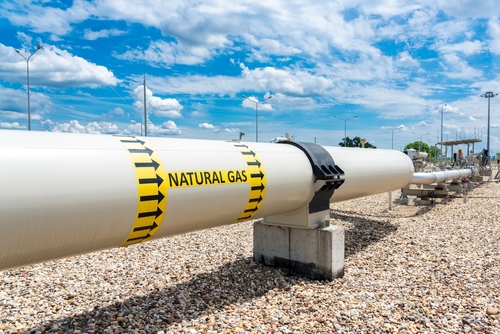
State Republican lawmakers and industry leaders on Thursday urged aggressive action to unlock Pennsylvania’s natural gas reserves, warning that regulatory barriers and delays are driving away jobs and investment at a critical moment for energy demand and infrastructure growth.
During the May 1 Pennsylvania House Republican Policy Committee hearing, titled “Exploring Pennsylvania’s Energy Potential,” state GOP committee members were united in their message: The state’s natural gas reserves represent a historic economic opportunity, but realizing that potential will require fewer regulations, faster permits, and bipartisan commitment to energy development.
Committee Chairman Rep. David Rowe (R-85) opened the hearing by highlighting the strategic importance of Pennsylvania’s energy sector, particularly its thermal baseload capacity — coal and natural gas plants that run around the clock.
Rowe pointed out that while renewable energy sources like solar have a place, they cannot yet replace the gigawatts produced by fossil fuel infrastructure.
“When you look at the intermittent energy sources, if you want to put a set of solar panels on your roof, that’s great, have that. I support your ability to do that,” Rowe said. “But let’s not pretend that a solar panel on a couple of rooftops is going to make up for the gigawatts that are being processed in these thermal energy facilities.”
“Because at the end of the day,” he added, “if the sun’s not shining, if the snow’s on the panels and the wind’s not blowing, there is no energy.”
Multiple lawmakers reiterated the need for an “all-of-the-above” energy strategy, including State Rep. Eric Nelson (R-57), who emphasized bipartisan cooperation and urgency in seizing economic opportunities — particularly for powering data centers and advanced manufacturing.
“If we don’t work together in a bipartisan manner to harness what’s in front of us, we could miss our data center window, which is very similar to the Marcellus Shale window of a decade ago,” Nelson said.
The committee heard from several stakeholders in the energy industry, including Mike Atchie, director of Community Outreach for energy infrastructure company Williams Companies, which employs more than 660 Pennsylvanians and contributes nearly $78 million annually to the state’s economy.
Atchie, who handles community relations and local government affairs for Williams in Pennsylvania and in the Northeast, said the Tulsa, Okla.-based company has operations across 24 states. Williams has been operating in Pennsylvania for several years, including its interstate transmission system in southeast Pennsylvania and robust midstream systems in the southwest and northeast portions of the state.
“Despite the significant achievements of building a world class infrastructure, the company and its many customers and industry partners face hurdles to our continued growth,” Atchie said.
At the macro level, for instance, Atchie said that the ability to move Pennsylvania-produced natural gas to neighboring states that need the supply is a significant hurdle for the industry.
“Northeast and New England markets face a growing demand for energy and as we look for resources to meet that demand, natural gas makes the most sense,” he said. “It’s reliable, cost-effective and best of all, it’s right here.”
But new pipeline infrastructure is critical, he added. “We are now at a crossroads where energy demand is critically outpacing supply,” said Atchie, noting that leaders of Northeast and New England states need to recognize the need to expand access to natural gas through new interstate pipeline infrastructure.
At a more regional level, Atchie said that natural gas represents significant opportunities for manufacturing and electricity generation.
“Regionally produced natural gas… can help ignite new economic development opportunities, including the growing demand for energy in the technology sector,” he said. “Pennsylvania has an opportunity to be a major player in the build out of reliable energy for high-tech data centers. So allowing the fast-paced build out of this infrastructure is critical. Slow permitting may become a hindrance to significant investments in the near future.”
Speedy permitting, on the other hand, would aid the timely development necessary to meet data center energy demand, he said.
“It’s a perfect storm of affordable and reliable natural gas being available to meet the fast growing demand for electricity,” said Atchie. “Ensuring these opportunities can be fully realized is important for both the energy industry and the technology sector.”
Tom Shepstone, a natural gas advocate and author, criticized what he called Gov. Josh Shapiro’s “green energy fantasy” and regulatory overreach by the Delaware River Basin Commission, which he claimed unfairly blocks gas development in Wayne County, Pa.
“We need to sue them on sovereignty issues and get Pennsylvania out of the Delaware River Basin Commission altogether,” Shepstone said. “Renewables are wrecking the grid by driving up prices and duplicating systems we already have.”
Shepstone added that lawmakers also should stop the utilities and PJM Interconnection from closing any more coal and gas plants. “State mandates are killing us everywhere,” he said.
Matt Coday, president of the Oil and Gas Workers Association, warned lawmakers that Pennsylvania risks losing out to states like Louisiana and Texas, which are attracting billions in energy investments. And he noted that the state has the resources — but not the regulatory climate.
“What you really have the burden of doing is shaping policy now for creating that regulatory certainty in this state,” said Coday. “We want stable power grids and we know that comes from PA natural gas. And really to set that policy going forward and say, hey, this is where we’re headed, that will create the jobs.”
“Whenever we talk about data centers and LNG exports, that creates demand,” he added. “And whenever there’s increased demand, prices go up. And when prices go up, there’s people who want to drill and drilling equals jobs. And that’s what we’re going for here.”